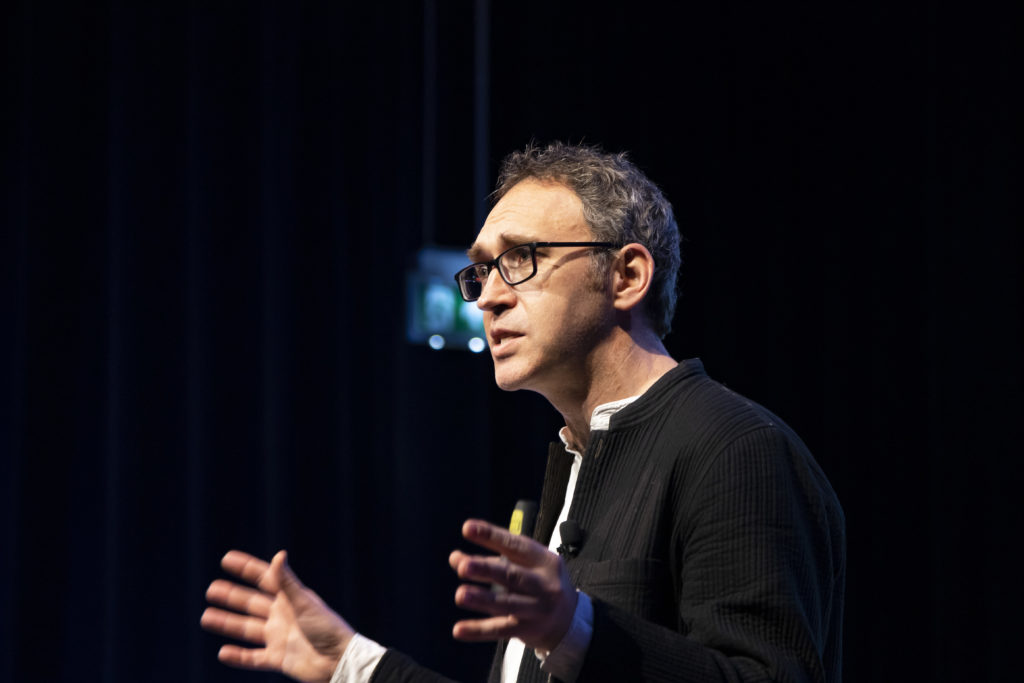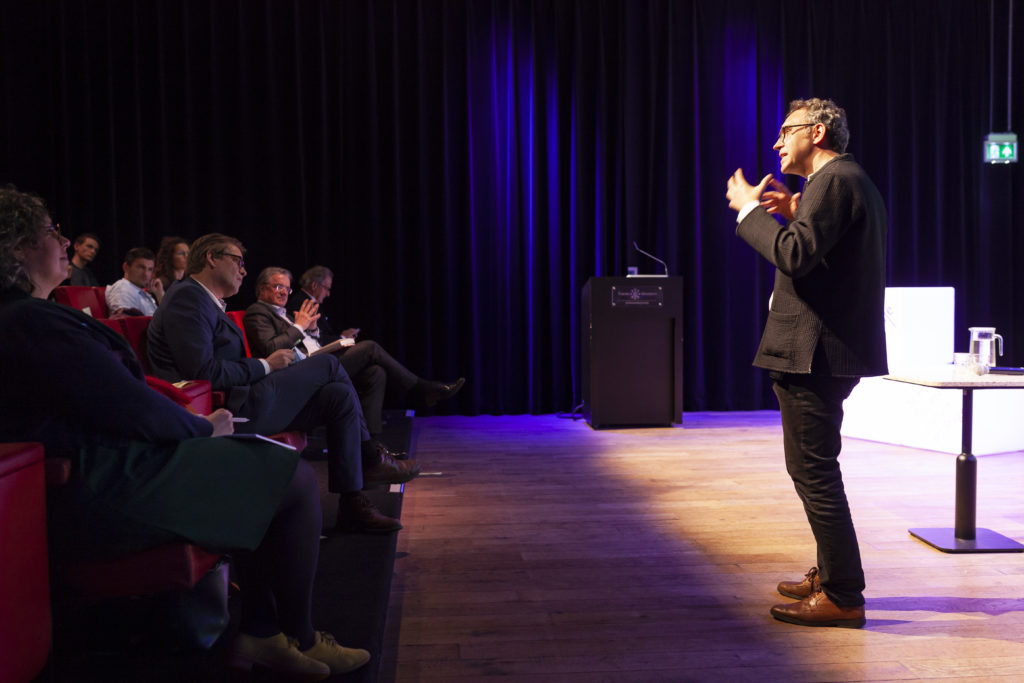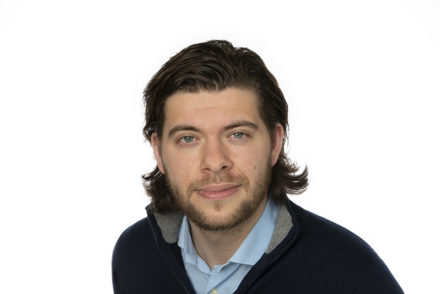Public philosopher Roman Krznaric: ‘If we succeed in being long-term thinkers, we may become the good ancestors future generations deserve’
Renowned philosopher Roman Krznaric visited Tilburg University to give a masterclass on his new book ‘The Good Ancestor’. During his lecture on 17 November, which was organized by Shift Talks and Studium Generale, Krznaric elaborated on the central message of his work, namely how to think long-term in a short-term world.

Krznaric opens his talk by introducing what he calls ‘the tug-of-war for time’, which is a battle taking place in our own mind between short-term thinking and long-term thinking. Each way of thinking is triggered by its own factors, with on the one side six drivers of short-termism and on the other six ways to think long.
Whereas the short-term drivers “threaten to drag us over the edge of civilization breakdown”, the six ways to think long “are drawing us towards a culture of longer time horizons and responsibility for the future of humankind”, Krznaric says.
As things stand, shortsightedness is on the winning side. According to Krznaric, we are being dominated by “pathological short-termism”, prompted by technologies that provide us with instant gratification while sustaining our dopamine addiction, or by our democratic systems in which politicians seem to look no further than their own term or election. We seem to be concerned only with what can satisfy in the present, which has led Krznaric to call this the age of the ‘tyranny of the now’.
How to fight this tyranny? Admitting this is not the easiest task, Krznaric offers us a mental toolkit that helps us to think long term. One of these tools is so-called ‘cathedral thinking’, meaning to embark on projects with a very long timespan beyond your own career and lifetime. Proof that humans are capable of this can be found in real cathedrals like the Sagrada Familia in Barcelona or in the sewers in London that were built in the 19th century and still function well today.
Another long-term strategy Krznaric proposes is the idea of intergenerational justice, which is to recognize the obligations and responsibilities we have to future generations. Never before have our actions had such potentially negative consequences for coming generations, forcing us to give them a political voice. Krznaric takes us to Wales, where they have put this into practice by installing a ‘Future Generations Commissioner’ who assesses policies for their impact on generations up to thirty years from today.
“It is people, projects and organizations like this that I think of as time rebels. They are dedicated to long-term thinking, intergenerational justice and, in the end, to being good ancestors. However, they do not know they are time rebels. They do not know they are an emerging global movement. For that reason, I want to bring them all together in a room and show them they are all doing the same thing, which is trying to think beyond the here and now.”
Do you consider yourself a time rebel?
“I am an aspiring time rebel. When I write books, I write about things I am not very good at. So I wrote a book about empathy, thinking I needed to become more empathic. Recently, I wrote this book on being a good ancestor, as I want to learn how to be a better ancestor. While writing it, I came up with the concept of a time rebel and thought that I would like to do more of that myself.
“That is when I started to engage in small acts of rebellion, like joining the Extinction Rebellion protests in London to get the government to change its policy on climate change. But they can be even smaller, such as when I went picnicking with my children in a 900-year-old tree. After we climbed the tree and sat down, we talked about deep time and how to connect with longer time cycles. I mean, that tree has been around there for nearly a thousand years.”
Do you think the politicians at COP26 in Glasgow showed themselves to be time rebels?
“Absolutely not. The whole summit has been a historically shameful dereliction of duty and a failure to take account of the science. I realize international negotiations are hard and some negotiators probably felt a genuine victory to have the word ‘coal’ mentioned in the final document. Yet if you look at it in a historical sense, there was, as in almost all COP meetings, a clear absence of time rebels. What was missing were time rebels at the table. Instead of being stuck outside, youth activists should have participated in the negotiation; that would be real climate justice.”
Will they ever get a seat at the table?
“Look, things do change. Our representative democracies have only existed for two hundred years. That means they are new. More and more do we see other forms of democracy popping up, such as participatory democracy and citizen’s assemblies. This way of deepening our democracy cannot happen fast enough. You can have all the Sustainable Development Goals you like, but if your political systems remain trapped in short-term decision making, you won’t get very far.”
Besides a reform of the political system, what would you think of a media reform? They also seem to contribute to short-termism by going from scandal to scandal and from scoop to scoop.
“The media technology is very immediate and we already get excited by just one notification. In that sense it is quite hopeless. Another major challenge for the media is its ownership; if media companies are owned by shareholders who want quick returns, the media will remain stuck in short-term cycles.

“So yes, reforms are needed in many areas of media. We should to try to expand its time span by focusing more on slow news, that is, news coverage that goes beyond the breaking news. These kind of media companies cover long-term stories and structural events.
“I also do not see any reason why digital technology cannot be used for slow and long-term thinking, we are basically children who have just started learning how to use these relatively new technologies. I really hope one day we will no longer get hopelessly excited by a notification.”
What other challenges does long-term thinking face today?
“The biggest one, I would say, is our addiction to economic growth. Our political and economic systems – particularly in the wealthy nations – are still so caught up in the idea of constant growth. As far as I know, I have never seen evidence that we can keep on growing while staying within safe planetary boundaries and creating a world that is safe for our offspring and theirs.
“I see it as the largest threat since it is based in five hundred years of capitalist history. This goes back to the beginning of the seventeenth century, when the stock exchange was invented in Amsterdam and the first public share offering was carried out by the Dutch East India Company. You could therefore say capitalism was invented in the Netherlands. In that sense, the Dutch have a great responsibility to help us move to a post-growth economy.”
Thinking beyond our own lives makes a great demand on people’s capacity for empathy. Are humans capable of being that empathic?
“I think so, even though it can be quite difficult. It is much easier to empathize with people living today, as you can look them in the eye and talk to them. You can really step into their shoes. With the people of tomorrow, this is a lot harder.
“Yet I believe it is possible to arouse empathy by creating imaginative bridges that connect us with those future people. This can be through something very personal like a family connection. When I close my eyes and imagine what the life of my now thirteen-year-old daughter will look like when she is ninety years old, I recognize she will not be alone.
“She will be surrounded by the natural world and a web of human relationships. It is this environment that will sustain her. So if I care about her future life, I need to care about all future life. That is the magic of it; by using human imagination we can get to something much bigger.”
Could we perhaps say that the current climate movement is proof of our growing empathy?
“That could be the case. It is the world’s largest social movement in all human history, which is pretty amazing. Since 1960, hundreds of thousands of environmental organizations have emerged around the world like a gigantic decentralized religion. I am convinced this is changing our values and is reshaping who we are. We’re not just shopping beings, we’re more than that.”






